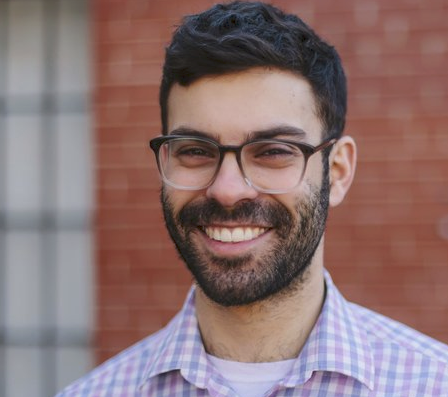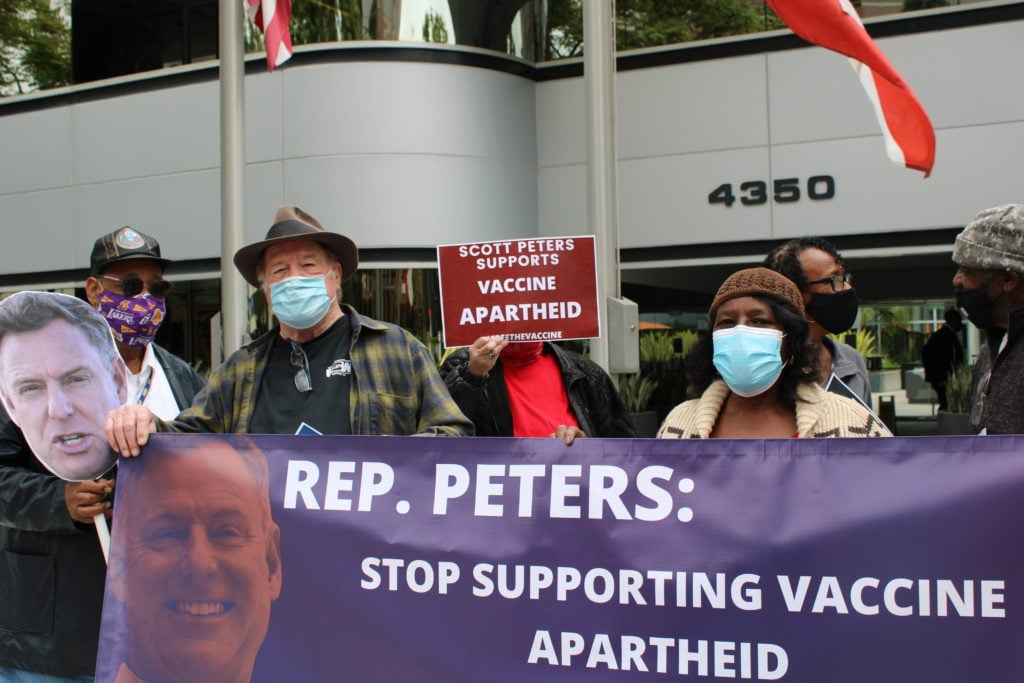Manzoor, a local activist in North Carolina, confronted U.S. Rep. David Price (D-NC 4) at a book talk over Zoom on April 27. “I have family in Pakistan where less than 1% of the population has been vaccinated and in neighboring India the situation is even worse,” Manzoor said. “Can you tell me why you do not support the TRIPS waiver?” Price, visibly irritated, replied that he didn’t want to upset pharma, or “the goose that laid the golden egg.”
The lack of vaccines that puts Manzoor’s family and billions of other people at risk is completely preventable. There is significant idle capacity to produce vaccines in the Global South, but factories can’t make them because doing so would risk expensive lawsuits from the pharmaceutical giants who hold the patents. Justice is Global, along with close to a dozen other organizations around the country like Health GAP, Center for Popular Democracy, Citizen’s Trade Campaign, Right to Health Action, and Public Citizen, has been campaigning for the TRIPS (Trade Related aspects of Intellectual Property Rights) Waiver, which would significantly lower barriers to vaccine production and allow a massive expansion in supply.
In a surprising and historic reversal, U.S. Trade Representative Katherine Tai announced on May 5 that the Biden administration would support the waiver. This has the potential to save millions of lives by boosting the response to COVID-19 globally. It also challenges the power of the pharmaceutical companies – and gives us the opportunity to organize on local issues with a global vision.
“No one is safe until everyone is safe” has become an almost mainstream position during the COVID-19 crisis. The by-definition-global nature of the pandemic and the sheer devastation of the last year have made the interdependence and interconnectedness of human life more visible than ever. Like a tornado ripping the roof off a house, COVID-19 has revealed structurally weak and vulnerable elements in the system we live in.
Most if not all progressive issues have a global dimension, impacted by the way global capital incorporates ever larger areas into the accumulation cycle. Thus organizing on the TRIPS Waiver can help us connect the budget-busting prices that tens of millions of Americans pay for meds they need with the preventable peril facing Manzoor’s family in Pakistan.
Demystifying decisions made in secret
The World Trade Organization (WTO) classifies patent rights as “intellectual property,” which is protected under its agreements. The governments of India and South Africa proposed that the WTO waive patent rights for COVID-19 vaccines as well as diagnostics, manufacturing know-how, and other COVID-19 therapeutics. Without this TRIPS waiver, millions in the Global South wouldn’t get vaccines for years. This raises the threats of more unnecessary deaths, and more deadly variants as well. One reason the surge in India is so devastating is that the mutations in the virus that have emerged are more virulent and more deadly. In some cases, the mutations prove resistant to vaccines. Some scientists even predict that COVID-19 will become endemic and we’ll need booster shots every year, just like the flu.
But organizing around TRIPS demands that campaigners wade deep into wonk territory. What does TRIPS stand for? How does that have anything to do with COVID-19? How could it impact our lives in any tangible way? The abstractness and inaccessibility of the issue is part of the problem.
Working with people like Manzoor and allies across borders like The People’s Health Movement and Equality Labs shows that the TRIPS issue is actually fairly simple. Currently, we prioritize the gains of some of the most profitable corporations in the world that bear almost no risk for their innovation. This comes at the expense of public health, any economic logic, and human rights. By framing the problem this way, the politics become much clearer. The TRIPS waiver is a direct extension of other progressive demands around inequality, healthcare, and challenging corporate power.
Yet currently decisions on this issue, like many others that have profound impacts on people’s lives, are made by obscure and unaccountable bodies.
Decision-makers in the realm of trade policy are unelected and largely escape public notice. The U.S. Trade Representative is appointed; bodies that make these global decisions like the WTO, the International Monetary Fund, and the World Bank are also unelected and removed from the public eye. They make consequential decisions that most people don’t even know about, let alone have a say in.
We can change that by pulling away the costumes that power wears to disguise itself. In this work, we can build on the lessons from the 1999 Battle of Seattle and from the access to medicines fights in the early 2000s: We can build strong and effective progressive coalitions to challenge multinational corporate power and neocolonialism. Though the foreign policy foibles of the Bush years and complacency of the Obama years put global justice movements on a back foot, the campaigns to quash the TPP and to influence the USMCA headed in the right direction. These efforts largely engaged older whiter trade union activists and opposed neoliberal technocracy. We can build a more multiracial and multigenerational movement, and in the process politicize trade policy and make it a kitchen table conversation to help reignite the global justice movement in the U.S.
Kitchen table conversations
The health care cohort of People’s Action had been planning a campaign on drug pricing, and saw the immediate parallels between TRIPS and their U.S.-based work with member groups in Nevada, Wisconsin, Maine, Alabama, Maryland, and Illinois. Their campaign challenges pharmaceutical monopolies in the U.S. that make it hard for people to afford basic medications like insulin. When they saw that the fight was against the same enemy and that there was an immediate opportunity, they decided to throw down with us. Not only has their power and infrastructure been helpful to move the TRIPS campaign forward, but the energy of the campaign has given these organizers hungry for winnable campaigns against pharma an opportunity to plug in. They asked for a postcard design to engage their members on TRIPS—expecting maybe a couple hundred responses. They’re now close to 6,000.
Manzoor spoke his mind to his congressman during a week of action on TRIPS that Justice Is Global and allied groups organized ahead of the May 5-6 WTO meeting. They confronted Democrats opposing the waiver like Rep. Scott Peters in San Diego and Senator Chris Coons of Delaware, even taking their protest to Coons’ house. They picketed outside the Cambridge, MA headquarters of pharmaceutical giant Moderna, held a People’s Shareholder Meeting outside of Pfizer, and allies at Global Justice Now in the UK participated in civil disobedience at Astra Zeneca, all during these companies’ annual shareholder meetings. The TRIPS waiver gained prominence in mainstream outlets like NYT, WaPo, and CNN and eventually won the support of the Biden administration.
This victory gives us momentum, but we still need to keep up the public pressure to ensure that we get 12 billion shots in arms in the Global South and to counter pharma’s aggressive counter-offensive. The pharma lobby has been mobilizing vast resources to fight the waiver and make it as narrow as possible. We need to push beyond the waiver towards technology transfer and financing.
Building our movement with global vision
Global issues like inequality, nationalism, and climate increasingly define our politics. Much like COVID, these issues will hurt those in the Global South disproportionately, but Global North countries will increasingly be impacted and feel the disruptions and pain of these crises. This will be especially true in diaspora communities with ties across borders. By taking on these issues as they get worse and doing so with an eye towards transnational solidarity and with a global vision, we can create the potential for new political formulations and a more deeply multiracial working class movement. For example, the TRIPS campaign has opened up new avenues to organize and engage the South Asian diaspora, which are urgent and powerful.
There is a dissonance right now between the scale of the crises we face and the scope of the progressive vision. People see the news about COVID-19 surges in India or ice caps melting and then have no outlet to address the global nature of these problems. Often the only available option is to organize around domestic politics. By providing opportunities and visions for our work that expand beyond the scope of our borders we can resolve this contradiction. We can provide outlets for our members and especially for people whose identities don’t stop at our borders. And in doing so we can live up to our values of solidarity, inclusivity, and transformation.
Did you enjoy this article?
We're in the middle of our annual fund drive, and this year we're building our own internal infrastructure for subscriptions, meaning more of every dollar pledged goes to fulfilling our mission. Subscribe today to support our work and be a part of Convergence's next evolution.

